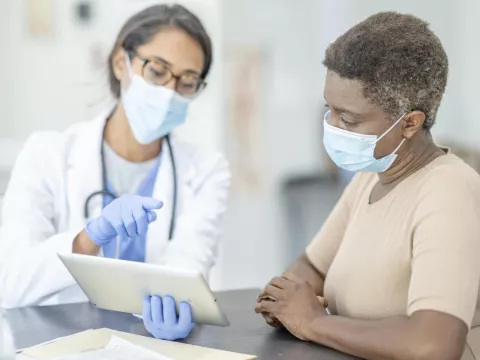- AdventHealth

Stomach pain and other gastrointestinal (GI) symptoms — such as cramping, constipation, or diarrhea — can range from minor discomfort to severe pain. Sometimes, it can be difficult to know when a little rest might do the trick, or you need to seek immediate treatment at a nearby emergency room or urgent care. But we’re here to help you understand the source of your pain and help you get back to feeling whole once again.
To know when and where you need to seek treatment, it’s important to be aware of your symptoms.
Understand Severe GI Symptoms
Not all stomach pain requires immediate medical care at a local emergency room. But certain symptoms along with your stomach pain can be a red flag for a more serious issue, such as a heart attack, cancer, or gastrointestinal disease. Have someone drive you to the nearest hospital or call 911 if you experience any of the following symptoms with your severe stomach pain:
- Acute pain on the lower right side of your abdomen (which may indicate appendicitis)
- Blood in vomit
- Chest pain or difficulty breathing
- Dark or black stool
- Fainting or feeling lightheaded
- Fever
- Irregular heartbeat
- Vomiting
Your medical history also plays an important role in deciding where and when to seek treatment. Head to the ER if you have abdominal pain and:
- Are over age 45 and also experiencing tightness in the chest
- Are pregnant
- Previously had gastric bypass surgery
- Recently had abdominal surgery or an endoscopic procedure
When Urgent Care Can Help You Heal
Even if your stomach pain or gastrointestinal issues aren’t severe enough to send you to the hospital, you still want to find relief quickly. When that happens, we are here to help you at one of our convenient urgent care locations. Our expert providers can give you a comprehensive exam to help understand the source of your GI or abdominal pain.
Urgent care can diagnose illness, order diagnostic tests, and help you find relief for mild to moderate stomach pain or GI issues, accompanied by other symptoms such as:
- Blood in the urine
- Burning during urination
- Chronic constipation
- Dehydration from diarrhea
- Fever above 100 degrees that lasts longer than three days
- Recurrent fever that returns after 24 hours of being fever free
Tips to Rest, Recover and Heal
It can be easy to overdo it after experiencing stomach pain or a GI issue — whether it was serious enough to send you to the ER or a stomach bug you battled at home. Here are some tips to let your body, mind and spirit recover before you jump back into your daily routine.
- Connect to your faith
- Enjoy a favorite TV show or movie
- Read a new book
- Visit with friends or family members
You may also experience a few lingering symptoms, such as stomach cramps, fatigue, or mild nausea. A few simple tips can help ease those symptoms and help you feel like yourself again:
- Use heat for stomach cramps
- Sip water, seltzer or ginger ale
- Try eating bland foods, such as rice, broth, crackers or pretzels
Partnering to Help You Feel Whole
We are committed to restoring your health and wellness as quickly and efficiently as possible with an entire network of physicians, specialists, emergency rooms and urgent care centers ready to help you feel whole. To learn more about how we can help you get back to whole health, call Call855-303-DOCS.


